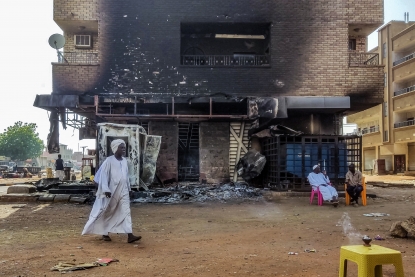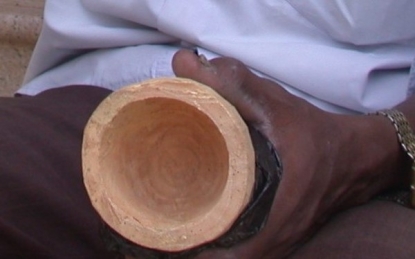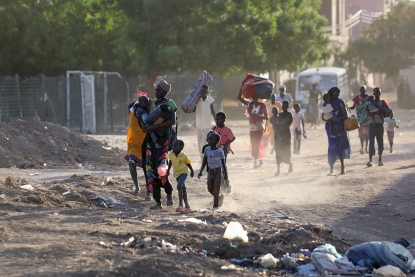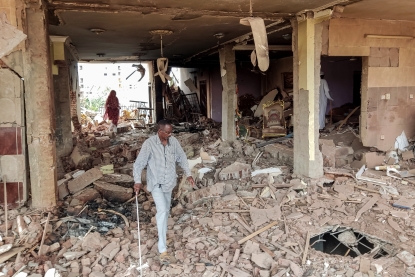Mohammed, where are you?
Ian Timberlake, AFP’s former Sudan bureau chief, would regularly call an old friend there for a chat. But not long after two rival generals plunged the country into war in April, Mohammed suddenly went silent
Years after I left Sudan, I still kept in touch with Mohammed. Then the war came. I called him my teacher, but more importantly, Mohammed became my friend. Now I don’t know if he is dead or alive.
Sudan’s war is more than two months old and has killed nearly 2,800 people. Roughly 2.8 million have been forced to flee their homes, including hundreds of thousands who escaped to neighbouring countries.
I got to know Mohammed several years ago while based in Khartoum as AFP’s Sudan bureau chief. He worked as a clerk of sorts and helped complete some documents for me. Mohammed was about my age, moustached, and – like me – balding.
I enjoyed his company and often visited his workplace just to savour the banter and laid-back atmosphere among him and his colleagues. Mohammed shared his knowledge of African culture, history and many other topics.
 A man walks past a burned-out bank in Khartoum on May 24, 2023 (AFP )
A man walks past a burned-out bank in Khartoum on May 24, 2023 (AFP )
He became my unofficial Arabic instructor. Once, I visited his home and met his family. I tried to repay the favours by delivering cooking oil and other essential goods for him and his colleagues during the Eid festival.
I cannot tell you his real name or further identify him because of the uncertainty surrounding his situation.
When my posting to Khartoum finished in 2014, Mohammed was with me to the end. He came to see me off, sitting on the steps of the modern apartment building where I lived and worked, before I boarded a minibus for the short ride to the airport.
Mohammed had brought two special gifts. One was a piece of palm leaf, light-green and firm. The other was a "funduk”, a handmade wooden mortar.
 Mohammed and the confiscated mortar (Ian Timberlake)
Mohammed and the confiscated mortar (Ian Timberlake)I am not quite sure what the palm was for, but I still have that precious leaf, which I guard protectively because of what happened to the funduk. Khartoum airport security seized it, claiming it could be a dangerous weapon.
After numerous run-ins with authorities who objected to our coverage under the then strongman Omar al-Bashir, I viewed the seizure as their final act of retribution.
I never had the heart to tell Mohammed.
I moved on to Saudi Arabia, then even further away to Washington, DC – closer to my hometown of Toronto – and now I’m nearer Sudan again, in Cyprus. Wherever I was, I called Mohammed. We talked loudly and shared laughs. “Ian ajooz”, (old man), he would say, or “Ian magnoon” (crazy).
He always pronounced my name incorrectly as “eye-an”, but to me it didn’t really matter. “How’s your wife? Are your parents OK?” And I would in turn ask about each of his cohorts.
Mohammed didn’t have a smartphone, so the only way to reach him was by calling his old mobile. Telephone links with Sudan had always been hit-and-miss. You’d often get a bouncy musical jingle and a woman’s voice cheerfully apologising that the number could not currently be reached.
 People flee their neighbourhoods amid fighting in Khartoum on April 19, 2023 (AFP )
People flee their neighbourhoods amid fighting in Khartoum on April 19, 2023 (AFP )
I’d keep trying and would eventually get through. Mohammed would talk in Arabic and I’d sometimes be able to respond. More often than not, I couldn’t understand but he patiently reverted to teacher mode, in English, trying to help me.
“You can say...” and he’d give an Arabic example or, more likely, various examples including in Sudanese dialect. He’d always spell out the words in English so they would be clear to me. “Thank you, my teacher,” I’d say in Arabic, to his amusement.
Just before the war began Mohammed asked if I could send him a smartphone, which he said would help him to teach me better. I wasn’t able to at the time. Maybe if I had, it would’ve been easier to reach him, although all communications have been badly affected by the war, and electricity is scarce.
I’ve had better luck learning the fate of other people I knew, and relieved to know they are OK. One survived the difficult journey to Ethiopia, arriving safely with his family. Some were fortunate enough to have been out of the country when the war began on April 15.
 People walk through the rubble of a home hit by artillery in Khartoum on June 6, 2023 (AFP )
People walk through the rubble of a home hit by artillery in Khartoum on June 6, 2023 (AFP )
In the earliest stages of the fighting I couldn’t reach Mohammed but finally got through after a few days. “A lot of people died,” he said. But he, his family, and his old gang all were safe, and it seemed as if he wasn’t worried about food supply.
Reassured, I let several days pass before I tried to call again. Again, again, and again. I have tried virtually every day since, often many times a day. All I get is that bouncy music and the woman’s cheerful voice.
Maybe Mohammed had to flee and couldn’t take his phone. Maybe he has no electricity to recharge it. Or maybe...
I’m left wondering if I will ever hear his laughter again. Where are you, my friend?
Edited by Fiachra Gibbons in Paris


